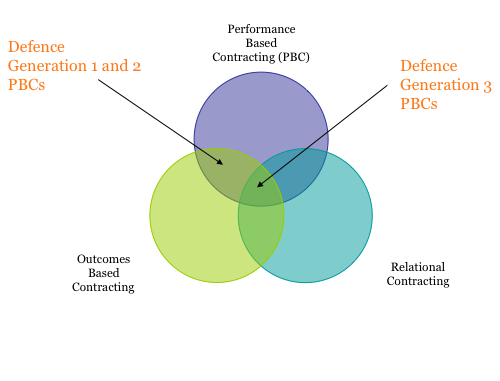My colleagues and I, probably like a number of you, have been to a number of presentations recently that have spoken about future of contracting being ‘outcomes’ based contracting. There are also a number of people talking about relational contracting. So this left me thinking, what is the difference between Performance Based Contracting (PBC), and ‘outcomes’ based contracting and relational contracting?
Performance Based Contracting (PBC) vs. Outcomes Based Contracting
The first question is how is PBC different to Outcomes Based Contracting? From my perspective there is no difference. In one article that describes Outcomes Based Contracting, they describe it as:
“The contract focuses on the desired outcome of the work to be performed (the “what”) rather than the manner in which it is to be performed (the “how”).”
For those who are familiar to PBC, the definition is identical (see the post Defining a Performance Based Contract (PBC)).
That said, I have had people argue with me that they are different; that a PBC is not focused on the outcome. Really? To this I would suggest that any PBC that is not incentivising the customer’s outcome is not a PBC, and indeed would lead to perverse incentives. Any PBC should incentivise the contractor to deliver the customer’s desired outcome, as otherwise, why have the contract? Therefore, I’d suggest that they are the same thing.
So to avoid confusion given PBC, and it’s North American version, Performance Based Logistics (PBL), have been around since the late 1990’s I would like to be so bold as to suggest we standardise by simply using PBC rather than outcomes based contracting.
Performance Based Contracting (PBC) vs. Relational Contracting
One area that we continue to evolve is the role of the relationship in a highly successful PBCs. In research my colleagues and I have undertaken, we proposed the following definition of a Relational Contract:
“Relational Contracting is a method to achieve mutually successful outcomes through an alignment of contracting party interests and processes that tackle the most frequent sources of suboptimal performance, covering more complex and project based sales/purchase arrangements and relationships in which governance is driven primarily through both the parties.”
This is simply an extension to the PBC definition. Indeed, for those who familiar with this blog, in a previous article we referred to 3 tiers of performance measures including a new tier, the Strategic Performance Measure (SPM). The SPM refers to ”high level outcomes” (i.e. at the strategic level) assessing performance against areas such as safety, cost and behaviours.
Using this extended definition of PBC, my colleagues and I have developed 2 standardised SPMs that we include in the majority of our PBCs to define and measure positive behaviours in deliver of the customer’s outcome. Specifically, Relationship and Best for Project. But more on this in the future post.
Summary
PBCs have evolved over the 10+ years my colleagues and I have worked with them. As can ben seen in the diagram below in the, late 1990’s and early 2000’s, the first generation of PBCs were focused on shorter-term outcomes (effectiveness). As PBCs evolved (generation 2) they become inclusive of other objectives such as cost. In more recent years, generation 3 PBCs have begun to include relationship and behviours in those descriptions of outcomes.
The question is, as we continue to evolve PBCs, what will a generation 4 PBC look like? Send me your thoughts.


Pingback: Revisiting Performance Based Contracts vs. Outcome Based Contracts vs. Relational Contracts | Performance Based Contracting (PBC) Blog